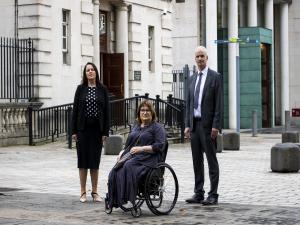
By David Young, PA
A judge has accused Stormont's Deputy First Minister of ignoring the rule of law by delaying a compensation scheme for Troubles victims.
Mr Justice McAlinden said Michelle O'Neill's stance in not nominating a Stormont department to administer the scheme - a requirement set out in legislation passed at Westminster - is "fundamentally inappropriate".
The scheme is in limbo due to a dispute between Sinn Fein and the Government over eligibility criteria that are set to exclude anyone convicted of inflicting serious harm during the Troubles from accessing the support payments.
Sinn Fein claims the scheme would be discriminatory and potentially exclude thousands of people from the republican community.
The judge expressed his view at the outset of a legal challenge brought by a woman who lost both legs in a Troubles bombing.
Jennifer McNern is seeking a judicial review of the Executive Office's failure to introduce the scheme, which should have been open to applications at the start of May.
Justice McAlinden told Belfast High Court: "I see it as one element within Executive Office deliberately choosing to ignore the requirement to comply with the rule of law to express a political advantage.
"That is a fundamentally inappropriate stance to take and it is a stance that this court will have no hesitation in describing in the bluntest terms and in requiring a remedy to be provided in the shortest timeframe."
Having read the arguments put forward by Ms McNern's legal team and the Executive Office, Justice McAlinden said his "initial view" of the issue was unlikely to change as a result of hearing the case in full.

Jennifer McNern pictured outside Belfast High Court today. Credit: PA
He adjourned the judicial review hearing for a short period on Monday morning and asked the legal parties to discuss whether they wished to proceed.
Justice McAlinden said he would hear the case in full if the legal parties adopted "entrenched positions" and wished to continue.
He said: "What I see here is there has been significant and unjustifiable delay. That delay cannot be allowed to continue and this scheme, which is a scheme enacted by the Westminster Parliament by primary legislation, followed up by regulations, this scheme is overdue and it needs to be brought forward and brought into operation as soon as possible for the benefit of those individuals, like Ms McNern and many others, who quite clearly have suffered for long enough without their suffering being appropriately recognised by our society.
"That is the initial view I take upon this case, having carefully considered the papers."
Northern Ireland Secretary Brandon Lewis is a secondary respondent to the case brought by Ms McNern.
However, the judge said he believed Mr Lewis had done all he could have been expected to do in relation to the scheme.
After a short adjournment, a lawyer representing the Executive Office said attempts were being made to contact ministers to seek instructions on the case.
The judge asked court officials to prepare an audio disc of his comments to be prepared for distribution to all parties.
The case then proceeded, with Ms McNern's lawyers outlining their case, pending the response from the Executive Office.
Ms McNern suffered life-changing injuries in a bomb attack at the packed Abercorn Restaurant in Belfast on a busy weekend shopping day in 1972.
No paramilitary organisation claimed responsibility but the IRA was blamed.
Ahead of Monday's hearing, Ms McNern said: "All we ever wanted was to be treated with respect and dignity and not be left as the part of the forgotten legacy of the Troubles.
"When the legislation was passed at Westminster we thought we had achieved that.
"But the refusal by the Executive Office to implement the legislation is devastating."


 Female pedestrian killed in road accident in Glengormley
Female pedestrian killed in road accident in Glengormley
 Protesters demonstrate ahead of first sitting of gold mine public inquiry
Protesters demonstrate ahead of first sitting of gold mine public inquiry
 Family ‘proud’ as Derry nun moves forward on path to sainthood
Family ‘proud’ as Derry nun moves forward on path to sainthood
 Newtownabbey Man in court charged with attempted murder of off-duty PSNI officer
Newtownabbey Man in court charged with attempted murder of off-duty PSNI officer